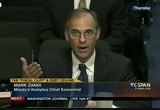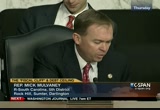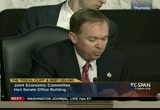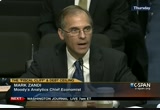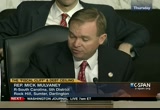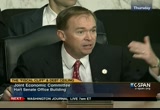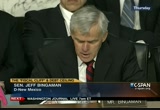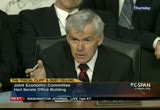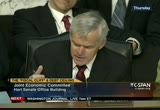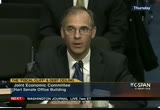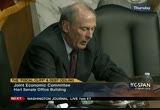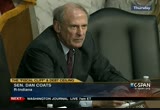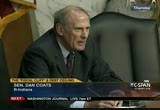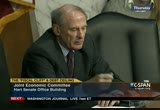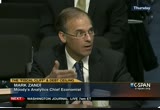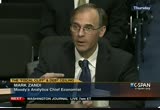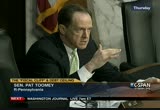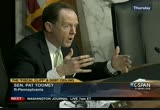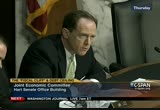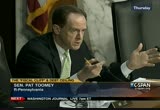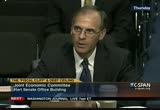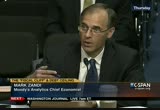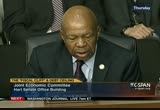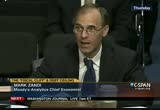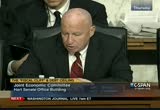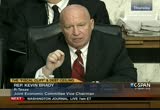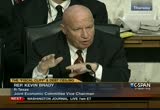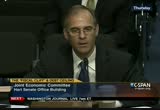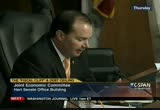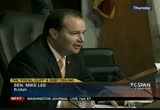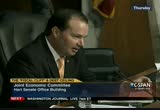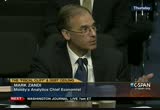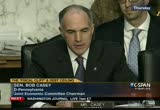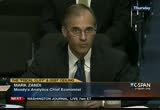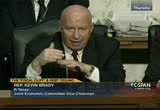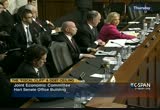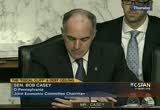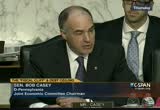tv Capitol Hill Hearings CSPAN December 7, 2012 6:00am-7:00am EST
6:00 am
if we do that, we are off and running here. >> my time is about to expire. dr. hassett, i would like to hear your analysis on how far apart we are and how we can close that gap. >> thank you. we have a tremendous opportunity to make sure that we hand off a thriving economy to our kids. i mentioned that it we were to run $600 billion deficit for the next 10 years, by the end of that, the debt -- it would lower our gdp forecasts. if we were to cut with the fiscal consolidations that $600 billion deficit to $300 billion, we would be buying future generations gdp growth in the long run.
6:01 am
by about half a% per year. it is ultimately a question of what kind of world we want to live in 10 years from now. if you want to look like the way europe has been growing, we will have a small consolidation, such as the small consolidation proposed by the president. if you want to have the kind of growth that i hope we can have with a bigger consolidation, that one is being proposed by speaker boehner. >> thank you. >> i would like to focus on something that is probably more of interest to the economists and ordinary people. let's talk about ratios. what i heard you lay out, dr. zandi, was more of an ideal situation.
6:02 am
they get you at roughly at $3 trillion. deficit-reduction over the course of 10 years. you went on to add the $1.20 trillion over last year's negotiations on the debt ceiling. the negotiations over last year's debt ceiling -- the new number would really be 1-1. that is not actually my question. i want to get to now. we have looked at the president's offer. we haven't found any spending reductions at all. we found the $1.6 trillion tax increases.
6:03 am
the stimulus spending,we saw the extension of the unemployment insurance, which is an increase in spending. the delay in the spending cuts whatsoever. do you think the president's current offer gives us the 2-1 test? >> no. it is short. he needs to come up with roughly $600 billion more in spending cuts over the next 10 years. i think that there are significant reforms in medicare, medicaid, agricultural subsidies, and other programs in the budget.
6:04 am
those are difficult things to implement. it takes a lot of guts to propose those things. i would not discount them. they are important. to answer your question more specifically, we do name or spending cuts to get to my ideal. -- we need more spending cuts to get to my ideal. >> policymakers need to reform entitlements. i do see members of the other party -- most notably, mr. hoyer --he said, not now. they are on the table for a later discussion. i have been disappointed that a lot of the discussion seems to be on the revenue side and not really on the cutting side. really quickly, the debt ceiling. there is something about your testimony that caught my attention, which is your
6:05 am
support for the initiative offered by senator rob portman. lawmakers can adopt a version of the so-called dollar rule to address the 2011 debt ceiling. policymakers could agree at the beginning to cover that here -- year's budget. they could -- adopting some form of this rule would be a good safeguard. i appreciate his comments. isn't this exactly what we did that now everyone is trying to get out of? we have a dollar of spending reductions. 1.2 is already in place. the other is in the sequester. isn't that what we did?
6:06 am
if that isn't a good idea, why are you and the the others now idea? >> let me say a few things. first, the broad context. we need to get rid of the debt ceiling law. it is agonistic. -- it is anachronistic. we need to get rid of it. i suggest that some version of the dollar for dollar rule should be incremented. at least considered. it does not need to be one-for- one. it could be 50%. that is not going forward.
6:07 am
-- that is now going forward. my view is that we need to nail down how we can get to fiscal sustainability. -- the $3 trillion i proposed,get rid of the debt ceiling law. we need some form of budget rule to make sure that some discipline going toward. >> structure. >> yes, structure. we need to show people that we will stick to this plan. >> thank you. >> thank you very much for being here. i appreciate your testimony. dr. hassett, dr. zandi has indicated that he inks the debt limit crisis we had in august 2011 was bad for the economy and the country and that we should avoid it for the future. do you agree with that?
6:08 am
>> first, yes. i think the best testament of this has been done by co- authors who have a very cool index of economic uncertainty. it is a very innovative paper. they estimated that the debt limit struggle probably subtracted about 1.5% from gdp growth during that summer when it was happening egos of the -- because of the was caused by levels of uncertainty. each time we go through that, there are consequences. i would like to add if that is what it takes to get spending under control, we need to concede that in the long run there will be a benefit, which means we do not have these deficits. in the fullness of time, whether
6:09 am
a struggle last summer was worth it, if we have the spending cuts and deficits are lower, it might have higher economic growth in the long run because we went to that struggle last year. >> your position is that we should be ready to go through that struggle again and to call upon the national debt is necessary in order to enforce spending limits? position. we should never default on the national debt. the politics of debt reduction, which you on the better than me, are very difficult. i am not a political expert. if there is something we need to do that helps deficit reduction occur, i am not willing to stop process. >> you are saying defaulting of the national debt might be something we need to do now and then? >> no, sir.
6:10 am
we do not default last summer. >> we did not. february. is it your position that we should be willing to default on the debt if that is necessary in order to force spending cuts? >> i would not be willing to circumstances. look at the history of what has been done. there is a long history of using that debt limit as a moment to distract from the party in power. if we had an academic seminar on the impact of the that struggle and the fiscal policy, he would say that it was a negative thing. there are times when having the extra power or the opposition is useful for either party. >> well, i have never until last
6:11 am
year of august 2011, i have not seen any serious effort or serious threat made by the leadership of congress to refuse to give the secretary of treasury the ability to offer to meet obligations congress had adopted. i thought that was a new experience for us. that happen. dr. zandi, you said you think that we need to repeal this law that tries to set a debt limit and concentrate more on taxing and spending policies that causes to raise the debt, as i understand? >> absolutely. it is a bad way to conduct policy. it is a problem. look at july and august of 2011. it was a mess.
6:12 am
gdp downgraded the debt. it really had an impact. cbo is estimating the interest costs is costing us money. it is pretty clear that this is not going to get any better going forward. it will be worse. this is a really bad way of doing things. we need to get rid of this. rules. we need to find a way to be credible. the debt ceiling approach is the wrong way of doing it. >> thank you, mr. chairman. >> thank you, senator. >> i want to pursue that question a little bit. this is on my mind also. my experience is the political system find it awfully difficult to say no to
6:13 am
constituents. with reelection in mind or a natural human tendency to want to please people rather than disappoint them. i had the privilege of meeting with christine lagarde from the imf. i asked about the reforms that were taking place in europe. i asked, would any of these reforms be taking place without europe being in a fiscal crisis mode? her answer was, absolutely not. unless the revolver is at the temple of the politicians with the finger on the trigger, they're not capable of summoning the collective will to tell the people that represent that they need to take steps to
6:14 am
resolve a problem and will cause so. my experience in the years i have had in politics was exactly that. we never would have gotten what we did in 2011 without the threat of defaulting on our debt. to think that we could put a structure in place today that perhaps we would all be comfortable with in terms of solving our long-term problems and be assured that 10 years or not that congress would not have modified that dozens of times to the response of into joints who -- to the cuts -- to the response to constituents who are banging on the door and saying this is to develop much policy for months around here, let alone 10 years. if you want to fix the long-
6:15 am
term situation, i think there is consensus that we cannot get from here to here to provide that kind of growth and what we want to hand off to future generations. we have to factor in a big factor of the political system here in the way politicians think and react. we need leverages in order to address that. i'm not really asking for a response. that. you have stated your position. i just wanted to add my two cents worth in terms of why i think it is important we have the leverage points. maybe there are other ways of doing this, but my experience is that the next congress or the current congress can undo that in a big hurry as the
6:16 am
constituents line up outside their doors. thank you, mr. chairman. >> can i -- in response? >> yes. >> in the case of putting the revolver against the -- in the case of europe, we do not want to do this on a regular basis. that'll be a problem for our economy. people will not be engaged unless they have clarity in this thing. institution. after the end of the day, you do the right thing. if you look at the history of this body, it roughly comes up with the right answer. we have not dealt with the debt this country.
6:17 am
we can do it. >> i will respond by saying that we have been trying to deal with our cascading debt and deficit for decades. i would say that we have been far short of doing the right thing to look for a healthy fiscal future. >> thank you, senator. >> i agree that we usually do the right thing but only after we try everything else. the time has come. i see this as a scary time. we need to protect our fragile economy, but it is also an opportunity to move forward. my first question is based on
6:18 am
your predictions -- what do you think the timeframe is for possible further downgrades from the credit rating agencies? >> this is my interpretation. i do not know for sure, but this is a guess from my experience. i think people outside of the beltway have a lot more faith in you than you do. reaction. we can go even into next year. by the way, i would counsel -- i would not come up with a deal unless it is a really good deal by the end of this year. i would take it into next year because you will get a better
6:19 am
deal. >> in other words, a deal that help us? >> in order to avoid a downgrade in the u.s. treasury debt, we need something lows to fiscal sustainability. -- close to fiscal stability. we need to get to $3 trillion. is a problem. >> ok. you brought up social security. don't we need more reforms to make that more solvent? do you see that as the money going back into social security taxif we were to embark on that and set up a commission, i think there is a lot of talk of ok, we should do that. they said the funds it should go back to social security to make it solvent. >> i think that is a perfectly reasonable way to do it. >> my colleagues said that in the near term he would rather see rates go up on the wealthiest americans because he believes it gives us a greater
6:20 am
long-term chance to reform the tax code. do you agree with this assessment? also, do you think this is awise course? we have talked about the spending cuts and the $2.20 trillion, plus we can get $700 billion whichi support going back to the clinton levels. do you agree? has assessment was we have to look at tax rates being raised on the wealthiest instead of just looking at deductions. >> i think we need to do both. if you are going down my path, we need both. there is no way to get to that number with tax reform alone. if you consider we will not take away a charitable deduction and if your goal is not to raise taxes from lower and middle-income houses. there is no way to do the
6:21 am
arithmetic. there is a lot of good ways of doing reform butthere is no good way of doing it to raise that kind of revenue. we need to do both. we need tax reform and we need higher tax rates on upper-income households. >> it seems to me you could do the tax rates at the end of the year because then you could make the kind of deal that you want. to some of the closing of the loopholes. -- and then do some of the closing of the loopholes. i would hope states that have strong businesses to support this,you could bring the corporate tax rate down and work on the debt by closing the loopholes and subsidies. >> tax reform is complicated. nail down a framework and then go to work and try to figure this out. in terms of corporate tax reform, that is absolutely necessary. the goal would be to make that revenue neutral.
6:22 am
you want to bring down those corporate rates. >> what did you think of senator coburn's assessment? he has worked very hard on this to reduce the debt limit>> i have a great deal of respect for the senator, but this, i disagree. it would accomplished very little in terms of economic efficiency. we have so many tax expenditures. with unemployment still high and manufacturing jobs going overseas, -- we need to seek ways to make ourselves a friendly place. i am very concerned that i have seen the president continues to say that 97% of small businesses would not be affected. it is a very misleading statistic. anyone who has any profit from a sale on ebay would have -- we would be calling them a small business.
6:23 am
businesses that employ people,more than half of the income is in that bracket. it is a bad time to keep all the tax expenditures and lifting taxes on the few people who are actually creating jobs in this economy. i strongly disagree. >> i have heard different things from businesses and>> they're willing to make some sacrifices as long as we really are on the right path. they see that as their own long-thank you to both of you. >> thank you to my colleagues from pennsylvania. i would like ask dr. hassett -- the president's proposal had some specifics. i think it is clear there is a headline tax increase that he
6:24 am
wants $1.60 trillion. what the administration would describe is $600 billion in spending reduction. it is much less even than that in spending restraint. for instance,it looks like 200 billion of what they put under the 600 billion is revenue. revenue. at all. sequestration. i am not clear how long that referral is meant to be. if it is for one year -- billion. then there is additional stimulus spending and other billion. that is $400 billion in the way. -- any way thatyou should legitimately deduct from the headlines 600 billion if he wanted to write what might
6:25 am
restraint. if you go back, $1.60 trillion of new revenue, maybe we have $200 billion in spending restraint, it is it fair to say that this is a 8 to 1 ratio? >> that is about right. restraint. >> that is right. there is some recidivism here in the sense that spending reductions have systematically been overstated in recent years by the president. it appears to me that there is a lot of tax increase and almost no spending reductions. >> spending programs that you launch, that money gets spent. promises of future savings? much less so. when the president talks about
6:26 am
new stimulus spending, i am not sure the savings would materialize at all. in reality, the president's proposal is almost entirely of new taxes and virtually nothing that is specific of the spending restraint. your research suggests that the most successful point of consolidation are those in which the ratio is almost the reciprocal of that. >> i can say with absolute certainty that a consolidation that has the shape of the president's proposal would fail. in the economy that we have now, in that kind of a world, it is impossible to envision generating the kind of healthy economic growth that the government is willing to have
6:27 am
the spending cuts we promise to do two years from now. we will be saying, we cannot afford to cut government spending because it will throw us into recession. >> that brings me to the next issue i would like to discuss. taxet to the president's increase package that he is looking for, he is calling for higher marginal tax rates. in addition, a reduction in the value of deductions and other expenditures. dividends. the way i count this up, if you include the limitations, the top marginal tax rates for some would be between 41 and 45%. that is just the federal level. we have states with varying income tax rates. some americans would be paying more than half of their income. it would exceed 50%.
6:28 am
if the president got all the tax increases that he wants, is likely that could precipitate a recession? >> it is not only likely, it would certainly do so. it is cataclysmic. , the dividend tax increase. if we go from a 15% dividend tax, to 45%, that is ridiculously bad news for an equity markets. it is something we saw on the other side. there is a very large academic literature that looked at how firms responded to the dividend tax reductionscall for response to the dividend tax reductions and there was a lot of positive movement. as a package, there is a question of how negotiations work and maybe you want to start negotiations with an extreme position, i cannot imagine anybody looking at proposal and not arguing that it would not throw us into recession.
6:29 am
>> rather than taking an extreme that is very harmful, you look for areas where the other side to meet halfway. for instance, because of the political imperative that has been created, if revenue has to be part of this, shouldn't at least be generated in the way it does the least economic harm? in your view, would you do less economic damage by generating revenue through reducing the value of expenditures than raising marginal rates? >> if you phase it in far in advance, for example, changing social security benefits when i retire now, he would have a positive growth the fed right now from the spending cuts because she would give clarity
6:30 am
to all the people worried about the future of america. >> my time has expired. >> good morning. health care inflation is a significant driver of medicare escalating before us, what do you think should be done to control that inflation? i heard what you said about medicare. that is -- no matter what you do, you still have this inflation going on. it is major. i would like to have your thoughts on that. >> let me say a few things. health care inflation in the last couple of years has slowed quite sharply. it has been about 3.5%. it is very positive developments.
6:31 am
some of that probably is due to the weak economy, which means less demand for services. some of its likely is do to the affordable care act. there is growing evidence of that. we do not know for sure. there are some positive experiences in the affordable care act that could reap benefits. the insurance exchanges, the independent payment advisory board. we will have to see how that works out. most encouraged about the cadillac tax. this is a tax on gold-plated health insurance policies for
6:32 am
folks like me. i get a very good health care package. if i get sick, i am unfettered in terms of my health-care consumption. it will make it more costly and i will start shopping for health care. that will create more transparency and get the growth in health-care costs down. we do not know what is going to work, but there are some interesting new programs that have potential. we should see how those worked out before we engage in some very significant structural changes. like a voucher program. we may have to go down that path, but it is much too premature to do that. we should see how these developments work. >> following up, "if temporarily going over the cliff
6:33 am
is necessary to achieving a good agreement, lawmakers should not hesitate to do so." how long do think we could stay over the cliff without doing significant damage to the economy? >> i think you could go into early february. by early february, it looks like you are not coming to a deal and investors began to discount the likelihood you're not coming to a deal, you will see stock prices decline, the bond market reacted. in fact consumer business, and would begin to erode. by mid-february, it would be doing a lot of damage. by the end of february, the debt will happen. you have about a month. a lot does depend on whether the treasury is permitted to freeze withholding schedules. that they can and will do that.
6:34 am
if they cannot, the damage will mount faster and you won't have as much time. >> a bad deal -- no deal is better than a bad deal. going back to, i am curious about, given your findings, do you believe the tax cuts for the first $250,000 in income should be extended immediately? is there any reason that it should be tied to tax cuts for the wealthiest in our nation? >> i think there should be done as a package. break thisnk you can apart becausei think it will create brinkmanship. the nailing down the tax code, nailing down the spending cuts, nailing down long-term sustainability, you have to do
6:35 am
this all once. works. done by the end of the year? >> no, i am skeptical. significant damage. i am hopeful that you can. i am an economist. i am playing a political observer, but my guess is that year. >> vice chairman brady. being late. thank you for your leadership. you have been a terrific leader, a tremendous to work with. i appreciate your approach and how you handle yourself. thank you very much. i think there is a bit of consensus in the sense that it is irresponsible to voluntarily
6:36 am
go off the cliff, but equally irresponsible to come to a solution that does not address the key issues facing us. spending discipline, of fixing a broken tax code, and dealing with our biggest challenges. economic growth works. average recovery in this recession might have cut the deficit to $430 billion. more than half, getting the economy going,returning to the pre-2008 levels. what is missing today, we know consumer spending is above what it was before the recession. government spending is above recession. business investment, that area is what continues to lag.
6:37 am
in your view, do you think raising taxes on the two marginal rates as well as capital gains dividends, does that encourage more business investment in the economy? >> the threat of those increases is a very big negative. mr. brady, one of the things economists use when they teach graduate classes is something called the handbook of public economics. you had to study that, too, mark. i know i did. one of the later editions, there is a chapter on how taxes effect business spending. we go into a very gory detail about how negative this can be. if the dividend tax is going to go up, a lot of firms would be hurt significantly by that.
6:38 am
they would be paring back their capital spending in anticipation of higher taxes in the future. businesses will look to the future when they decide what they're going to do. they are not investing. right now. they think their taxes will be higher. you see it's in the investment data. it is why this recovery has been so slow. businesses have a lot of cash and are not making a lot of investment. >> your point is this does not help the economy. >> you could go back to the writings, he was a scholar who identified very early on that business cycles, recessions, and recoveries tend to be driven by investment because consumers are pretty steady, but investments can be fluctuating.
6:39 am
his view of the problem of stabilization policy was to try to stabilize investment and not to focus on consumption. one reason we have had such a disappointing recovery is that we have not address the fundamental reason why investment is so weak. right now. higher tax rates? convenient. it does not solve the economy. it does not solve the deficit. it is not a serious deficit proposal. the credit rating agencies are looking for a plan that lowers the gdp to debt ratio. i do not think there is a magic number. i do think to focus and our
6:40 am
biggest driver is going forward,social security, medicare, to on them. will be more important in the number on discretionary spending or tax cuts themselves. do you think the president's plan adequately addresses the sustainability of medicare and social security? further. i do not think it is enough. i believe the proposals are good ones. i think they are hard proposals to make because they're substantive. to achieve fiscal sustainability in the context of $3 trillion in 10-year deficit reduction, i think we need to do more. >> looking at the republican plan and the president's proposal, do you see any common ground? >> the common ground is that we're looking at the same
6:41 am
proposals. cbo has scored a number of different approaches. i also think there is no general agreement in the context of the current discussion, we will not make any major structural changes to these programs. we will not block grant medicaid, and we will not voucher or premium support medicare. in this context, it becomes dollars and cents. this is not going to be easy. i would suggest that in this quest for more reform to medicare and medicaid, if we can say by the 10th year of the budget horizon that we are on the right path, i think that is
6:42 am
ok. entitlement reform -- >> the number is whether we have solved the problem. years. this is a long-term problem. we should be thinking about this in a 20 or 30-year horizon. cbo scoring makes it incredibly difficult. we don't want it to force us to make -- >> i would like to take a step back and step in a slightly different direction from the fiscal cliff and talk more about long-term and medium-term economic realities we face. in your written testimony to this committee, you warned against kicking the can down the road indefinitely because of the adverse effect that might have on the economy.
6:43 am
it might have. i thought your analysis was definitely something we need to pay attention to. as you observed in the failure to make progress in this area now could signal that we have bigger troubles ahead. the moody's analytics model that you used breaks down about 2028. the reason it does that because at that point, the interest on our national debt will start to cripple our economy. recourse. i'm not sure there is a tax increase on the planet that could suddenly fix that. money fast enough.
6:44 am
of argentina. i tend to think of this medium and long term risk as the fiscal avalanche. the cliff is something we are approaching now and we can see where it is. we know will hit the cliff. the avalanche is different. the only thing you know about conditions are present. you know when the snowpack has built up to the point where it could happen. you do not know when it is going coming. once it hits you, the avalanche becomes completely impossible to control. do you agree with this characterization about the avalanche? kind of threat?
6:45 am
that from you? >> i would be happy. >> i will give you credit. i think it is right. i do think -- that is why what important. this is a once in a generation opportunity for you to nail these things down. we're not that far apart. i really do not think we are. if you are able to put us on a credible path to fiscal sustainability, do it in a balanced way, i think we are golden. i think we will avoid that avalanche. if we do not do that, ultimately, it means we will by that avalanche. that in order to avoid the conditions? >> i do not know the answer to
6:46 am
that. my model breaks down. it will happen long before that. next four or five or six years. >> here is the thing. the problem is, if we do not address this, we will be stuck in this slow growth netherworld of going forward. we will get nailed by something. i do not know what it is, but something bad is going to happen. that is going to be the thing that sets off an avalanche. >> a credit downgrade? contemplating. it could be oil prices or other geopolitical thinker. we do not know what that will be, but it will happen.
6:47 am
we will set ourselves up for that avalanche. to get this right. downgrade? if that were to happen, doesn't that call into question all kinds of things? money market funds and other types of investment funds are chartered to invest only in a certain grade of funds. if all the sudden u.s. treasuries were downgraded, wouldn't that have a pretty significant the fact on where we are relative to the avalanche? >> if there is downgraded treasury debt, this would likely trigger other downgrades. anything backstopped by the government would be downgraded. bank debt, they will get downgraded. jpmorgans of the world.
6:48 am
state and local government debt will get downgraded. you are right,money managers have in their relationship with their clients agreements not to invest in bonds that have rates below a certain grade. they will have to divest downgrades. credit markets. the credit markets will ultimately adjust. the reality has not changed. you will see hedge funds and private equity firms, but that is the process. it will take time. between now and then, it will create a greater amount of turmoil. it is what this means. it means that we do not have the political will to nail this thing down. and we will not. until we are forced by the avalanche. we will go nowhere. >> if you want to preserve the entitlement, get us to balance.
6:49 am
>> get us to sustainability. >> thank you, mr. chairman. my time has expired. >> i have one more question. i know we could be here a while if we had the time. i am grateful for the patience of witnesses. i was looking at the testimony and on page 8, he walks through the question of this balance of how you do the balance between cuts and revenue. in the second full paragraph, he says, using a range of different methodologies, the average unsuccessful fiscal consolidation relied upon a 53% tax increase, 47% spending cut spurred a successful consolidation consists of 85% spending cuts.
6:50 am
that. 15. if not, why not? what would your approach be? >> i respect kevin's work a lot. i think that number varies considerably depending on the country and it depends on where cycle. it also depends what the reserve is with respect to monetary policy. rates are 4 or 5%. 0. which is where we are today. there has been a lot of really good work revolving around these issues and trying to get good benchmarks for fiscal consolidation. a really great paper came out of the imf the last couple of days on this issue. it makes a very strong case that there was a fiscal speed limit. you cannot have too much fiscal
6:51 am
consolidation too quickly. it becomes counterproductive. this balance between tax and spending in the context of the u.s., particularly when the economy is weak, the spending multipliers, when you cut spending, they are very large, much larger them was previously thought. 15. in the context of where we are today, that is not right. having said that, i would do something like that proposed. -- like i propose to, -- like the proposed,two-one kind of ratio. if you do that, that is balanced and it did system reasonably good place. it gets us to fiscal stability and avoiding the avalanche.
6:52 am
it is still more spending than tax, but it is more balanced. the last thing i would say, we're talking about taxes and point. tax reform is spending cuts. there is no difference. if i give you a mortgage check. no difference. you can treated as a tax or spending andfrom an economic perspective, they are one in the same thing. when we do tax reform, from an economic perspective,that is a spending cut. >> i do not have anymore questions. unless the vice chairman does. >> looking at our global competitors who find themselves in financial crisis showed more than 20 times in nine different countries, those countries cut what they owed in their spending time.
6:53 am
they did that because their cuts were large, credible, politically difficult to reverse. believable. it created the confidence to grow an economy. it was proven over and over again. that is the model for this fiscal cliff discussion, making both the cuts and the reforms that are real and credible and politically difficult to reverse. send. it is the right signal to send to investors that we're serious about getting our financial house in order. i hope was that we do that. chairman, thank you. this is your last committee meeting and you will be missed. thank you again.
6:54 am
>> going back to the analogy of the avalanche, when we had the subprime crisis, and there was no warning. one day the avalanche came and there was a total loss of confidence and a fall in the market. likewise, we did have the same type of avalanche come tomorrow. there is no more confidence, nobody buys are debt. -- our debts. they want to sell it andwe would have increased interest rates and huge economic problem. we have two things in front of us. not only the fiscal slope, but also the debt ceiling. treasury estimates at the end -- february. they are very close together. in solving it, would be better to put the debt ceiling in the package with the fiscal slope for a comprehensive solution? or would it be better to do them separately?
6:55 am
>> they should be done together. this will not work if we break this thing apart. we need to scale back the cliff. we need to raise or eliminatewe need to achieve fiscal sustainability. this needs to be a package. and it has been done very soon. >> i agree. >> i want to thank both of you for your testimony. >> thank you very much. i appreciate your good work and your leadership. thank you for your testimony. i think we made in 90-minute meeting. that is pretty close. that is pretty good. i want to thank both of our witnesses again for their testimony. by the way, without objection, the full text of your opening statements will be in the record of this hearing. isre grateful because it
6:56 am
clear to most americans we do have a substantial challenge with regard to the cliff. we know if we do not take the right steps, it could jeopardize our economic recovery. we cannot afford to lose ground on the gains we have made. i am confident we can get this done. the congress of the united states can successfully reached the compromise we need to assign a path to fiscal stability. this is my last hearing. it. i have enjoyed this work as chairman and as a member of the committee the last six years. i am looking forward to more work on this committee as well. our work on job creation, deficit reduction, manufacturing issues and other issues has been informed by the perspective of many of our nation's top economists.
6:57 am
two of them are with us today. and from other leaders in the profit sector. we're grateful for those answers. i also have a great working brady. i am grateful for his work and the work of both parties on this committee. i would also like to recognize three retiring members. senator bingaman has served on the committee continuously from 1987 forward, 25 years of service. congressman from new york served from 1996-1998 and from 2005 until the present. they will all be retiring from congress at the end of the year. as well as senator web. the record will remain open for
6:58 am
five business days for any member of the committee who wishes to submit a statement or additional questions. if there is nothing further, we are adjourned. thank you. [captioning performed by national captioning institute] cable satellite corp. 2012] [no audio] [no audio] >> this morning, the national journal post a discussion on the u.s. economy and new polling on
6:59 am
the middle class with participants from think tanks, academia, and business with live coverage at 9:30 eastern on c- span 2. >> or the history of literary culture of the new york capital city of albany this weekend on book-tv on c-span 2 and american history tv on c-span 3. today on c-span, "washington journal" next. james taylor will be at the national press club and this evening, a discussion about skilled immigrants with mark warner and aol founder steve case. in 45 minutes, the national correspondent for "fiscal times" on the fiscal cliff negotiations, a discussion and a look at the future energy production and consumption in
127 Views
IN COLLECTIONS
CSPAN Television Archive
Television Archive  Television Archive News Search Service
Television Archive News Search Service 
Uploaded by TV Archive on

 Live Music Archive
Live Music Archive Librivox Free Audio
Librivox Free Audio Metropolitan Museum
Metropolitan Museum Cleveland Museum of Art
Cleveland Museum of Art Internet Arcade
Internet Arcade Console Living Room
Console Living Room Books to Borrow
Books to Borrow Open Library
Open Library TV News
TV News Understanding 9/11
Understanding 9/11